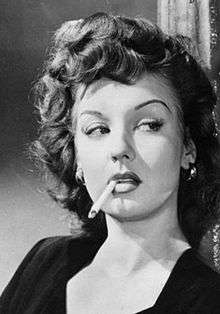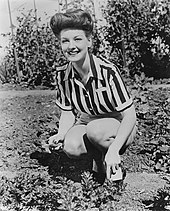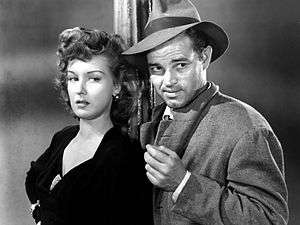Ann Savage
Ann Savage (born Bernice Maxine Lyon, February 19, 1921 – December 25, 2008) was an American film and television actress. She is best remembered as the cigarette-puffing femme fatale in the critically acclaimed film noir Detour (1945). She featured in more than 20 B movies between 1943 and 1946.
Ann Savage | |
|---|---|
 Savage in Detour (1945) | |
| Born | Bernice Maxine Lyon February 19, 1921 Columbia, South Carolina, U.S. |
| Died | December 25, 2008 (aged 87) Hollywood, California, U.S. |
| Occupation | Actress |
| Years active | 1943–2007 |
| Spouse(s) | Clark Tennesen ( m. 1939–1941)Cleland Huntington ( m. 1944–1945)Bert D'Armand ( m. 1943–1969) |
Effectively leaving the film business in the mid-1950s, Savage made occasional appearances on television and worked for industrial and inspirational film producers from the 1950s to the 1970s. She made a number of live appearances at film festivals, especially for screenings of Detour.
In 2007, she was cast by director Guy Maddin as his mother in My Winnipeg, "a part that had been tipped to bring her an Academy Award and which introduced her to a legion of new fans".[1]
Early life
Ann Savage was born in Columbia, South Carolina.[1] During her early years, her family was on the move constantly as her father, an officer in the United States Army, moved from base to base.[2] After he died when Bernice was four years old, her mother moved the two of them to Los Angeles.[2] Growing up around the corner from the Jewelry District, the Broadway movie palaces of downtown Los Angeles served as her babysitter, while her mother worked selling jewelry.[3]
She attended 64th Street Grammar School, and Mount Vernon Junior High, and first stepped on a soundstage at the age of 17 at MGM Studios, screen tested by Edgar Selwyn, Ann spent time among the more famous Hollywood kids of the day such as Lana Turner, Judy Garland, Freddie Bartholomew, and Deanna Durbin.[3] Her MGM test did not work out, prompting her to get her teeth capped[3] and acquire theatre training at the Max Reinhardt workshop[1] on Sunset Boulevard.[3] Reinhardt oversaw her name change, and Bernice became Ann Savage. The Reinhardt school's manager, Bert D'Armand, became Savage's agent, and the two later married.[2] Savage was offered a screen test by Fox, but she decided not to turn up, as she knew the studio already had a bevy of pretty blondes.[1]
Career
1940s
Savage instead made a screen test with Columbia Pictures — after playing Lorna in a Reinhardt acting showcase of Odet's Golden Boy"[3] — and was offered a contract.[1] Recalling Columbia mogul Harry Cohn as "a friendly Uncle type", Savage remembered Cohn being intimidated by acid-tongued Rosalind Russell. The two actresses featured together in What a Woman!, one of a dozen films with Savage to be released in 1943.[1]
Although Columbia typically groomed its girls in the mold of Rita Hayworth, Savage's look echoed Ann Sheridan, although her customary blonde locks were reddened for Footlight Glamour (1943) "so that the star, Penny Singleton, would be the only blonde on screen."[1] She joined Joan Davis and Jinx Falkenburg in Two Senoritas from Chicago (1943), and starred (as a brunette) in the first of several outings with Tom Neal in Klondike Kate (1943).[1]
Detour (1945)
Although Savage and Neal did not see eye-to-eye (she found him "childlike"), the duo would star together in Two Man Submarine and The Unwritten Code (both 1944), before their most famous film, the 1945 film noir Detour. Reminiscing in the 1980s about her career as a stalwart actress in B movies, Savage dismissed most of her roles as "mindless", saying: "The actresses were just scenery. The stories all revolved around the male actors; they really had the choice roles. All the actresses had to do was to look lovely, since the dialogue was ridiculous". Detour, she felt, was different. The two leads underwent role reversal, with Savage's Vera blackmailing Neal's Al, in a style described by her manager Kent Adamson as "vicious and predatory...very sexually aggressive".[1]
Although the B-feature was shot quickly in 28 days,[4] its status has been cemented over the years.[1] Director Wim Wenders called her work "at least 15 years ahead of its time", and The Guardian termed Ann "a Garbo for our times". More recently, critics such as Derek Malcolm and Barry Norman have praised the film, with Norman calling Savage "sultry and sexy...a feline film noir star at its finest". After Detour, although Savage starred in a half-dozen more films during the later 1940s — including Scared Stiff (1945), The Spider (1945), The Dark Horse (1946), and Satan's Cradle (1949; a rare Western) — her most prolific years were behind her.[1]
When Detour entered the public domain, it frequently was syndicated on television channels, and released in numerous VHS incarnations. Gaining cult status[2] and garnering critical acclaim as "arguably film noir's greatest low-budget feature", this exposure earned Savage a new, younger, following.[1] From the 1980s, Savage also attended a number of film festivals, helping to bolster her personal status, and leading her to emerge once more as "a glamorous figure-about-Hollywood at film festivals and galas".[1]
In 1983, she attended a screening of Detour held as a tribute to director Edgar Ulmer[1] with Ulmer's widow Shirley.
1950s
Savage drifted towards television, and found she liked the pace, featuring in showcase programs Fireside Theatre, Schlitz Playhouse of Stars, and The Ford Television Theatre between 1950 and 1955.[1] She also guest-starred in episodes of Front Page Detective, Gang Busters, City Detective, and Death Valley Days (The Pioneers), but ultimately found herself being offered fewer and fewer roles. She continued to act on the big screen, including in Allan Dwan's Women They Almost Lynched (1953) with Audrey Totter, Joan Leslie and John Lund.[1]
Savage eventually started appearing in commercials and industry films before essentially withdrawing from acting in the mid-1950s.
Personal life

Savage was a popular pin-up model during World War II, including a centerfold in Esquire shot by George Hurrell, and she was a tireless seller of war bonds on two tours.[3] She briefly was married to Clark Tennesen between 1939 and 1941, and then married her agent (and the Max Reinhardt school manager) Burt (or Bert) D'Armand around 1942–45. The two lived in New York City from the late 1950s until his sudden death in 1969.[2]
After her husband's death, Savage returned to Los Angeles to be near her mother,[2] and took odd jobs to finance flying lessons, becoming a licensed pilot in 1979.[1] Her manager quoted her as saying that she loved flying because it put her "closer to God and Bert".[3] She also became part-owner of a small tool company, and later took a secretarial course and became a docket clerk receptionist, and then a secretary at the law firm Loeb & Loeb in Los Angeles.[1]
Savage was keen on the "preservation and celebration of all things Hollywood", becoming a volunteer and advisory board member of Hollywood Heritage.[3]
Later years
Savage's exposure and the praise heaped on Detour led to her appearing in the 1986 film Fire with Fire and in a guest role on the television show Saved by the Bell.
My Winnipeg
In 2007, she enjoyed a comeback,[1] and rave reviews, when Canadian filmmaker Guy Maddin cast her as his mother in his My Winnipeg (2008), a "personal portrait of his hometown".[2] Maddin, according to Savage's manager, is a fan of Detour, and Savage's role in his film—"a part that had been tipped to bring her an Academy Award"—also "introduced her to a legion of new fans, including Steven Spielberg, John Travolta, and Martin Scorsese".[1] Maddin has stated that he cast Savage because she "would have scared the pants off Bette Davis".[2] My Winnipeg was critically acclaimed and won prizes from both the Toronto Film Critics Association and the San Francisco Film Critics Circle, as well as the Best Canadian Feature Film at the Toronto International Film Festival and a Genie Award nomination.
Death
Remaining blonde through her 80s, and continuing to attend film festivals and galas, Savage had a series of strokes and became a resident of the Motion Picture and Television Country House and Hospital in California.[1] She died in her sleep on December 25, 2008, aged 87. Her cremated remains were interred with her husband D'Armand at the Hollywood Forever Cemetery in Los Angeles, California. Her personal and career memorabilia will become part of the Harry Ransom Center at the University of Texas at Austin, alongside the archives of Robert De Niro, David Mamet, David O. Selznick, Gloria Swanson, and others.[3]
Legacy
In 2005, Savage was elevated to the status of "icon and legend" by the Academy of Motion Picture Arts and Sciences. In 2007, Time named Savage's role as Vera in Detour one of the "Top 10 Movie Villains" and Detour as one of the 100 best movies.[3] In 2010, McFarland and Co. published Savage Detours: The Life and Work of Ann Savage, by Kent Adamson and Lisa Morton.
Partial filmography
- One Dangerous Night (1943) - Vivian
- After Midnight with Boston Blackie (1943) - Betty Barnaby
- Murder in Times Square (1943) - Miss Ruth (uncredited)
- Saddles and Sagebrush (1943) - Ann Parker
- The More the Merrier (1943) - Miss Dalton (uncredited)
- Two Señoritas from Chicago (1943) - Maria
- Passport to Suez (1943) - Valerie King
- Dangerous Blondes (1943) - Erika McCormick
- Footlight Glamour (1943) - Vicki Wheeler
- Klondike Kate (1943) - Kathleen O'Day
- The Beautiful Cheat (1943) - Jane Drake
- Two-Man Submarine (1944) - Pat Benson
- The Last Horseman (1944) - Judy Ware
- Ever Since Venus (1944) - Janet Wilson
- The Unwritten Code (1944) - Mary Lee Norris
- Dancing in Manhattan (1944) - Valerie Crawford
- Scared Stiff (1945) - Sally Warren
- Midnight Manhunt (1945) - Sue Gallagher
- Apology for Murder (1945) - Toni Kirkland
- Detour (1945) - Vera
- The Spider (1945) - Florence Cain
- The Dark Horse (1946) - Mary Burton
- The Last Crooked Mile (1946) - Sheila Kennedy
- Lady Chaser (1946) - Inez Marie Polk / Palmer
- Renegade Girl (1946) - Jean Shelby
- Jungle Flight (1947) - Laurey Roberts
- Any Number Can Play (1949) - Woman in Office (uncredited)
- Satan's Cradle (1949) - Lil
- Pygmy Island (1950) - Capt. Ann R. Kingsley
- Pier 23 (1951) - Ann Harmon
- Woman They Almost Lynched (1953) - Glenda
- Fire with Fire (1986) - Sister Harriet
- My Winnipeg (2007, Documentary) - Mother (final film role)
References
- "Ann Savage" (Obituary) in The Daily Telegraph, January 2, 2009 Archived November 11, 2012, at the Wayback Machine
- "My Winnipeg's Ann Savage dies" (obituary) at CBC News, December 28, 2008. Accessed January 7, 2009 Archived April 22, 2009, at the Wayback Machine
- Adamson, Kent, "Ann Savage: A Friend to Hollywood Heritage". Accessed January 7, 2009 Archived February 14, 2012, at the Wayback Machine
- Morton, Lisa; Adamson, Kent; Maddin, Guy (2009). Savage Detours: The Life and Work of Ann Savage. McFarland. p. 61. ISBN 978-0-7864-4353-6.
External links
| Wikimedia Commons has media related to Ann Savage. |
- Ann Savage on IMDb
- Ann Savage at AllMovie
- Ann Savage at Find a Grave
